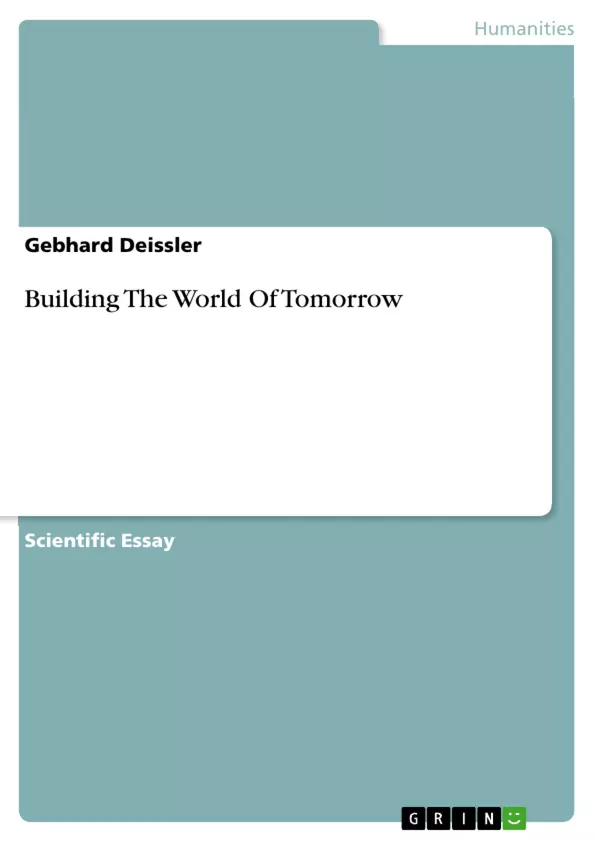If one analyzes the past, one notes that, for thousands of years, the same roundabout has been going on and perpetuating itself over centuries and millennia; the same cycles at the individual and the diverse social levels are enacted across time, space and cultures, albeit with culture-contingent nuances – as though that was the only way of being.
Inhaltsverzeichnis (Table of Contents)
- Tomorrow Means Time, the Future
- The Logic of Time and Matter
- The Past and Its Impact on the Future
- The Ambivalence of Time
- Building a Sustainable Future
Zielsetzung und Themenschwerpunkte (Objectives and Key Themes)
This text examines the intricate relationship between the past, present, and future, exploring the ways in which past conditioning influences the present and shapes the future. It investigates the limitations of relying solely on intellectual understanding for change, highlighting the power of ingrained biological and psychological programming in perpetuating existing patterns.
- The impact of past conditioning on the present and future
- The limitations of intellectual understanding for change
- The role of biological and psychological programming in human behavior
- The importance of understanding the underlying logic of the mind
- The need to identify and discard elements of the past that hinder a sustainable future
Zusammenfassung der Kapitel (Chapter Summaries)
- Tomorrow Means Time, the Future: This chapter introduces the concept of time as a continuous flow, linking the past, present, and future. It emphasizes the influence of past conditioning on our present and future, highlighting the challenges of transcending this conditioning for change.
- The Logic of Time and Matter: This chapter delves into the logic of time and matter, explaining how our biological and psychological makeup is inherently tied to the concept of continuity and survival. It argues that any attempts to drastically alter this fundamental logic may be met with resistance, as it threatens the very foundation of life.
- The Past and Its Impact on the Future: This chapter explores the limitations of relying solely on intellectual understanding for change. It points out that the power of ingrained conditioning can easily overwhelm even the most sophisticated attempts to break free from past patterns. The chapter suggests that true change requires a deeper understanding of the underlying logic of the mind.
- The Ambivalence of Time: This chapter delves into the complexities of past conditioning and programming. It argues that merely examining the surface-level expressions of these forces is insufficient for true understanding. The author advocates for a deeper exploration of the underlying rationale behind these phenomena, encompassing not just cultural but also psychophysical aspects.
- Building a Sustainable Future: This chapter emphasizes the importance of identifying and discarding elements of the past that hinder a sustainable future. Drawing an analogy to architecture, it argues that building a solid future requires a sound foundation that actively supports progress while discarding those elements that threaten stability.
Schlüsselwörter (Keywords)
Key themes and concepts explored in this text include: past conditioning, future building, time and matter, biological and psychological programming, intellectual vs. deeper understanding, change and resistance, sustainable future, cultural and psychophysical layers.
Frequently Asked Questions
How does past conditioning influence our vision of the future?
The text argues that past conditioning creates a cycle where we repeat the same patterns, making "tomorrow" often just a continuation of "yesterday."
What are the limitations of intellectual understanding for social change?
Intellectual understanding is often insufficient because deep-seated biological and psychological programming overrides rational decisions for change.
How do biological and psychological programming affect human behavior?
This programming is tied to survival and continuity, causing resistance to any changes that threaten the mind's established logic.
Why is it important to identify elements of the past that hinder progress?
Just like in architecture, a solid future requires removing unstable foundations from the past to prevent the new structure from collapsing.
What is the "logic of time and matter" mentioned in the text?
It refers to the fundamental way our physical and mental existence is bound to time, which governs our reactions and perceptions of reality.
How can we build a more sustainable future foundation?
Building a sustainable future requires a deep exploration of our underlying rationale and the conscious discarding of harmful cultural and psychophysical layers.
- Arbeit zitieren
- D.E.A./UNIV. PARIS I Gebhard Deissler (Autor:in), 2010, Building The World Of Tomorrow, München, GRIN Verlag, https://www.grin.com/document/163613



